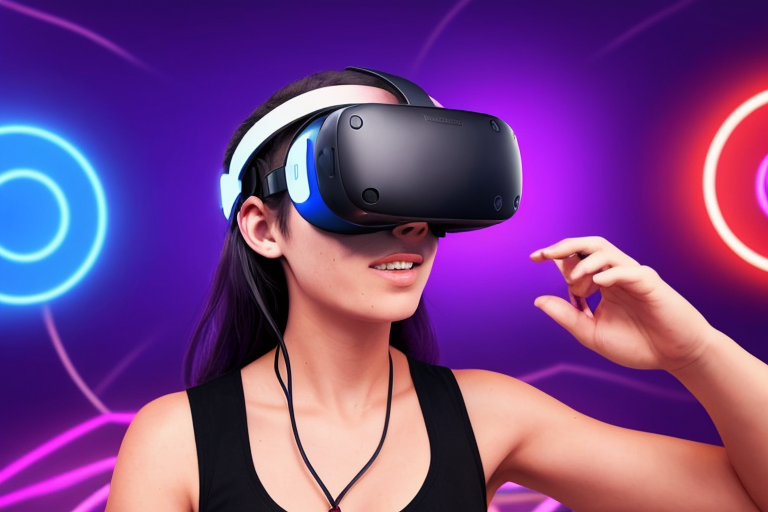Exploring the Latest Advancements in VR Tech and How They are Shaping the Future of Gaming
Virtual Reality (VR) technology has come a long way since its inception. It is a computer-generated simulation that immerses users in a three-dimensional environment, allowing them to interact with it using special equipment such as headsets and hand controllers. The technology has the potential to revolutionize the gaming industry by providing more immersive experiences and enhancing gameplay mechanics.
Over the years, there have been significant advancements in VR technology. One of the most notable developments is the cutting-edge headsets that are now available on the market. These headsets are more comfortable, have higher resolution displays, and offer a wider field of view than their predecessors. They also come with built-in headphones, which provide a more immersive audio experience.
Another significant development in VR technology is the introduction of haptic feedback suits. These suits simulate touch and other physical sensations, allowing users to feel like they are truly inside the virtual environment. This technology has the potential to transform the gaming experience by providing a more realistic and immersive experience.
Motion tracking technologies are also a crucial development in VR technology. These technologies allow users to move around in the virtual environment and interact with objects using hand controllers. Room-scale VR is another significant development that allows users to move around in a physical space and have their movements tracked in the virtual environment.
All these advancements in VR technology are transforming the gaming experience. With more immersive experiences, enhanced graphics and sound, and improved gameplay mechanics, gamers can now enjoy a more realistic and engaging gaming experience.
The gaming industry is also experiencing emerging trends that are shaping the future of gaming. eSports is one such trend that has gained popularity in recent years. It involves competitive video gaming, where professional gamers compete against each other in organized tournaments. Mobile gaming is another trend that is gaining popularity, with more people playing games on their smartphones and tablets.
Interactive streaming services are also emerging as a trend in the gaming industry. These services allow gamers to stream their gameplay live over the internet, allowing others to watch and interact with them in real-time. This technology has the potential to transform the gaming industry by providing a more social and interactive gaming experience.
As VR technology continues to advance, it has the potential to become mainstream in the gaming industry. Game developers are already exploring the potential of VR to create more immersive and engaging games. However, increased competition in the gaming industry due to VR technology could also lead to challenges for game developers.
While VR technology has the potential to revolutionize the gaming industry, it also has implications for society. There are potential negative effects on mental and physical health, such as motion sickness and eye strain. However, VR technology also presents opportunities for education and training, where it can be used as a tool to provide immersive and engaging learning experiences.
The Future of Gaming: Latest Developments in VR Technology
Virtual Reality technology has come a long way since its inception, with cutting-edge advancements being made in recent years. These developments have transformed the way we experience gaming, making it more immersive and realistic than ever before. In this section, we will explore the latest developments in VR technology and how they are shaping the future of gaming.
One of the most significant advancements in VR technology is the development of cutting-edge headsets. These headsets provide a more immersive experience, with higher resolution displays and wider fields of view. They also come equipped with advanced tracking systems that allow for more precise movements and interactions within the virtual environment. Companies such as Oculus, HTC, and Sony have been at the forefront of this technology, with their respective headsets, the Oculus Rift, HTC Vive, and PlayStation VR, leading the way in the VR market.
Another development that has revolutionized the VR gaming experience is the introduction of haptic feedback suits. These suits provide users with a more tactile experience, allowing them to feel the virtual environment they are in. The suits use a combination of sensors and actuators to simulate different sensations, such as pressure, vibration, and temperature. This technology has the potential to transform the way we play games, making them more immersive and engaging.
Motion tracking technologies have also played a significant role in the development of VR technology. These technologies allow for more precise tracking of movements, enabling users to interact with virtual objects in a more natural way. The most common motion tracking technology used in VR is the use of handheld controllers, such as the Oculus Touch and the PlayStation Move. These controllers provide users with a more intuitive way to interact with the virtual environment, allowing for more immersive gameplay.
Room-scale VR is another development that has transformed the VR gaming experience. This technology allows users to move around in a physical space while being tracked in the virtual environment. This provides a more immersive experience, allowing users to explore and interact with the virtual world in a more natural way. Room-scale VR is currently available on the HTC Vive and the Oculus Rift, with other companies expected to follow suit in the near future.
Frankie Uvanni, a renowned VR developer, has been at the forefront of these developments, working tirelessly to push the boundaries of VR technology. His latest project, a haptic feedback suit called “The Touch,” has been praised by critics for its innovative design and realistic sensations. Uvanni believes that VR technology has the potential to transform the gaming industry, making it more immersive and engaging than ever before. He also believes that VR technology will become mainstream in the near future, with more companies investing in its development.
Uvanni’s son, who is also a VR developer, has been working on a cutting-edge headset that he believes will revolutionize the way we experience VR. The headset, which is currently in development, boasts a wider field of view and higher resolution displays than any other headset on the market. It also comes equipped with advanced tracking systems that allow for more precise movements and interactions within the virtual environment.
The Future of Gaming: More Immersive and Engaging Than Ever Before
Virtual reality technology has revolutionized the gaming industry, providing gamers with an unparalleled level of immersion and interactivity. With cutting-edge headsets, haptic feedback suits, and motion tracking technologies, gamers can now experience a level of realism that was once unimaginable. But what does this mean for the future of gaming? In this section, we will explore the ways that VR technology is transforming the gaming experience, and how it is shaping the future of the industry.
One of the most significant ways that VR technology is transforming the gaming experience is by making it more immersive. With VR headsets, players can step into a virtual world and interact with it in ways that were previously impossible. They can explore new environments, interact with objects, and engage with characters in a way that feels natural and intuitive. This level of immersion creates a more engaging and entertaining gaming experience that keeps players coming back for more.
In addition to providing a more immersive experience, VR technology is also enhancing the graphics and sound of games. With VR headsets, players can experience games in a way that feels more lifelike and realistic. They can see details that were previously impossible to render, and hear sounds that are more nuanced and detailed. This level of realism creates a more engaging and entertaining gaming experience that keeps players coming back for more.
But it’s not just the graphics and sound that are being enhanced by VR technology. Gameplay mechanics are also being improved, making games more challenging and rewarding. With VR technology, players can interact with games in new and exciting ways, using their bodies and movements to control the action. This creates a more dynamic and engaging gaming experience that keeps players on the edge of their seats.
As VR technology continues to evolve, we can expect to see even more exciting developments in the gaming industry. One emerging trend is eSports, which is rapidly growing in popularity. eSports involves competitive gaming, where players from around the world compete against each other in virtual environments. With VR technology, we can expect to see even more immersive and engaging eSports competitions in the future.
Another emerging trend is mobile gaming, which is becoming increasingly popular among gamers. With VR technology, mobile games can be even more engaging and immersive, providing players with an experience that feels more like console gaming than mobile gaming.
Finally, interactive streaming services are also becoming more popular, providing gamers with a way to watch and interact with other players in real-time. With VR technology, these services can be even more engaging and interactive, providing viewers with a level of immersion that feels like they are in the same room as the players.
Emerging Trends in the Gaming Industry
The gaming industry is constantly evolving, and new trends are emerging every year. With the rise of VR technology, these trends are being shaped in new and exciting ways. In this section, we will explore some of the emerging trends in the gaming industry and how VR technology is influencing them.
eSports
One of the most significant trends in the gaming industry is the rise of eSports. eSports refers to competitive video gaming, where professional players compete against each other in organized tournaments. The popularity of eSports has exploded in recent years, with millions of viewers tuning in to watch these competitions online.
According to Frank Uvanni, a gaming industry analyst, “eSports is one of the fastest-growing trends in the gaming industry, and VR technology is playing a significant role in its growth.” VR technology is being used to create more immersive gaming experiences for players and viewers alike. For example, VR headsets can be used to provide a first-person perspective of the game, giving viewers a more immersive experience.
Mobile Gaming
Another trend that is shaping the gaming industry is mobile gaming. Mobile gaming refers to games that are designed to be played on mobile devices such as smartphones and tablets. Mobile gaming has become increasingly popular in recent years, with millions of people playing games on their mobile devices every day.
VR technology is also influencing the mobile gaming industry. VR headsets can be used to create more immersive mobile gaming experiences, allowing players to feel like they are part of the game. For example, VR headsets can be used to provide a first-person perspective of the game, giving players a more immersive experience.
Interactive Streaming Services
Finally, interactive streaming services are another trend that is shaping the gaming industry. Interactive streaming services allow players to stream their gameplay live to an audience of viewers. Viewers can interact with the player by sending messages and making suggestions during the gameplay.
VR technology is also being used to create more immersive interactive streaming experiences. For example, VR headsets can be used to provide a first-person perspective of the game, allowing viewers to feel like they are part of the game. Additionally, VR technology can be used to create more interactive experiences for viewers, such as allowing them to control the camera angle during the gameplay.
VR and the Future of Gaming
Virtual Reality technology has come a long way since its inception, and it’s no surprise that it has become an essential part of the gaming industry. With cutting-edge headsets, haptic feedback suits, motion tracking technologies, and room-scale VR, the gaming experience has become more immersive than ever. But what does the future hold for VR and gaming?
The potential for VR to become mainstream in the gaming industry is enormous. As more and more game developers embrace VR technology, we can expect to see a surge in the number of VR games available to consumers. Frankie, a game developer who has been working on VR games for several years, believes that VR is the future of gaming. “VR allows players to experience games in a way that was never possible before. It’s like being inside the game world, and that’s something that gamers have always wanted,” he says.
With the rise of VR technology, we can also expect increased competition in the gaming industry. As more game developers start creating VR games, gamers will have more options to choose from. This increased competition will push game developers to create better and more immersive games, which will ultimately benefit gamers.
But it’s not just about the competition. VR technology has the potential to change the way we play games. With VR, game developers can create games that are more interactive and engaging. Imagine playing a game where you can physically move around and interact with the game world. That’s the kind of experience that VR can provide.
Young gamers are already excited about the future of gaming with VR. John, a 12-year-old gamer, says, “I can’t wait to see what games will be like in the future with VR. It’s going to be so cool!” John’s excitement is shared by many young gamers who see VR as the future of gaming.
However, there are also concerns about the potential negative effects of VR on mental and physical health. Prolonged use of VR can cause motion sickness and eye strain, among other things. Game developers need to be mindful of these concerns and create games that are safe for players to use.
Despite these concerns, VR technology has the potential to transform the gaming industry and provide gamers with an experience like never before. As more game developers embrace VR technology, we can expect to see a surge in the number of VR games available to consumers. The future of gaming with VR is bright, and we can’t wait to see what game developers come up with next.
The Impact of VR on Society
As VR technology continues to advance and become more accessible to the general public, it is important to consider the potential implications it may have on society. While VR has the potential to revolutionize education and training, as well as provide new and immersive forms of entertainment, there are also concerns regarding the negative effects it could have on mental and physical health.
One of the potential negative effects of VR is the risk of motion sickness. This is especially true for room-scale VR experiences, which involve physically moving around within a virtual environment. For some individuals, this can lead to feelings of nausea and disorientation. Additionally, prolonged use of VR headsets can lead to eye strain and headaches.
Another concern is the potential impact of VR on mental health. While VR can provide an escape from reality, it could also lead to feelings of isolation and detachment from the real world. In extreme cases, this could lead to addiction or other mental health issues. It is important to note, however, that research on the long-term effects of VR on mental health is still in its early stages.
In addition to education and training, VR also has the potential to transform the way we experience entertainment. However, this could lead to increased competition in the gaming industry, as more companies begin to invest in VR development. This could have a major impact on the industry as a whole, potentially leading to the emergence of new players and the decline of traditional gaming companies.
Overall, it is clear that VR technology has the potential to have a significant impact on society. As with any new technology, it is important to carefully consider both the potential benefits and risks. While there are certainly concerns regarding the negative effects of VR on mental and physical health, there are also opportunities for VR to be used as a tool for education and training. As the technology continues to evolve, it will be important for individuals and organizations to stay informed and adapt accordingly.
The Pros and Cons of VR on Society
Virtual Reality technology has been making waves in the gaming industry, but its impact on society extends beyond entertainment. While VR has the potential to revolutionize education and training, it also poses potential risks to users’ mental and physical health.
One of the most significant concerns with VR is its potential to cause motion sickness and other physical discomforts. Prolonged use of VR can lead to headaches, nausea, and eye strain. These symptoms can be particularly severe in children and individuals with preexisting medical conditions. As VR technology continues to advance, it is crucial to address these concerns and develop safety guidelines for users.
Another potential negative effect of VR is its impact on mental health. Studies have suggested that prolonged use of VR can lead to feelings of disorientation and detachment from reality. This can be particularly concerning for individuals with preexisting mental health conditions, such as anxiety or depression. It is essential to monitor the impact of VR on mental health and develop strategies to mitigate any negative effects.
In addition to education and training, VR also has the potential to transform the way we experience entertainment. VR can provide a more immersive and engaging gaming experience, allowing players to fully immerse themselves in virtual worlds. This can lead to more compelling storytelling and more innovative gameplay mechanics.









